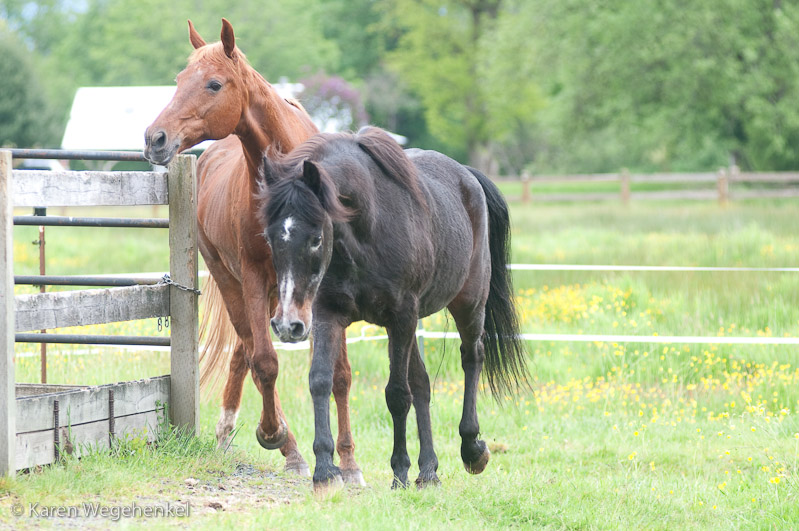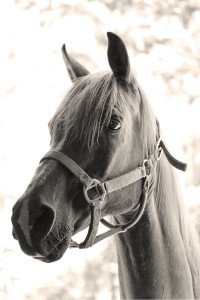“Old horses have a place in this world and it deeply saddens me that people can’t give them the retirements they deserve.”
My Operations Director, Terry Phelps, wrote this in response to assistance we were working to provide through our Community Outreach services. Her frustration touched me, but also echoed an ongoing frustration I have experienced over the course of nearly three years on SAFE’s Board of Directors. With my term coming to a close at the end of the month, I want to take a moment to briefly step onto a soapbox to talk about our obligations to our older horses.

Summer and Buckwheat — two old friends who survived neglect and were able to finish their lives with dignity
SAFE is regularly asked to intake elderly horses for a variety of reasons. Sometimes the owner is experiencing hardship and can no longer care for her elderly friend. Other times, the horse’s owner has passed away and the new caretaker needs help figuring out what to do with her new, elderly horse. These situations often warrant assistance, whether that be in the form of education, taking in the horse, or, in certain cases, offering to use the Serenity Fund to pay for a dignified end. While these situations can be emotionally difficult to navigate, they are usually coming from a legitimate place of hardship and concern for the horse.
More disturbingly, we frequently get requests to take older or unsound horses because people simply do not want them anymore. You may have seen similar situations in person or publicly on the Internet: the older horse is either no longer rideable at the level the owner wants to compete (or her kids to compete) or is no longer capable of carrying a rider at all. The owner wants a new, younger, more rideable horse and “doesn’t know what to do with” the older horse. This is code for “please take my horse so I can buy a new one.” These requests are universally declined.
It is completely ethical to responsibly rehome a horse for any number of reasons. SAFE promotes and encourages responsible rehoming of horses, including our own horses that have been adopted. If an owner has to sell a SAFE horse, they do so with our blessing. We simply ask the new owner sign an adoption contract and meet the same basic requirements as the original adopter: appropriate shelter, safe fencing, a clean environment, and safely stored feed. Selling a horse to a new, responsible owner can be a great gift to the horse.
However, a love of riding does not entitle a person to own a riding horse that can carry us to our dreams. If that were the case, we would all own Grand Prix dressage horses, derby hunters, or the champion in your favorite discipline. Sometimes our partners are injured or elderly and simply cannot do the job, or any job, anymore. Asking an equine rescue to take a horse so that you can then buy another horse is asking your local community to foot the bill for your riding career. This is unethical.
Every horse eventually has to be retired. Sometimes you will have to be the one to pay for it. If you cannot afford a second horse, which is the case for most people, you may need to partially lease or borrow a horse for awhile. You might not to get to ride as much as you want or own the fancy horse of your dreams. This is the reality that most of us face in a world of finite resources.
One of the greatest gifts you can give to your horse is the gift of soundness and quality training. While traumatic injuries can lead to an unexpectedly short career, many physical issues can be managed with appropriate diagnosis and treatment early on. If you recognize when your horse is beginning to struggle, work with your veterinarian to diagnose and manage the issue. You might add years of usable comfort and life to your horse’s career. If he is kept comfortable, he can likely retire from a difficult job into an easier, pleasant life of teaching novice riders the joy of learning new skills. The exercise is likely to keep them in better shape than just standing around in a field growing old. Schoolmasters will happily plow through a bag of carrots at the end of a lesson, but they have to be have been trained and kept serviceably sound to have this option.
When your horse’s career is over, have a plan for what is next. If his quality of life is good, find him a nice space to live out his remaining years with fellow oldsters. If his quality of life is deteriorating, consider a hospice program: let him have one more beautiful summer basking in the sun, manage his pain, and stuff him with as many treats as your vet will allow. Set a day to let him go surrounded by his friends and family. These horses give us everything; the least we can do is give them an end filled with love.
Kyle Putnam
SAFE President



Beautifully written Kyle! I agree and appreciate everything you wrote! My precious horse lived out his retirement to the age of 33. He was able to have green pastures and live on a beautiful farm where he was well cared for. I wish this could be the reality for all horses when they are no longer able to “perform” for their humans…
When I first got my horse, I told my husband that when Pablo got old we were going to keep him and watch over him so nothing bad ever happened to him. I could not ride him his last two years or afford another horse but took care of him daily to keep him comfortable. When he was no longer comfortable, it was time to say goodbye. Very hard after 20 years of being best friends.
To all at SAFE: this commentary strikes home to anyone who has cared for, and loved our equine partners. Like life, this is not for today, it is for the journey. Thank you Kyle for so eloquently putting in words what the heart tells us. Thought, caring, with an eye to the future. They deserve our commitment for a lifetime. Thank you for saying it.
Beautifully written Kyle. While I am still waiting to move forward with once again having a riding horse of my own, it is ALSO my dream to hopefully be able to always offer a “retirement” forever home to a “retired” friend in need. I also have a dog companion from Old Dog Haven and gave him the best final year of his life and I hope to do that again one day soon when we have the property and room for more “old dogs”. (For now my husband says small house with two bigs dogs,a cat, and another cat big enough to be a dog, is full enough!) And again, in honor of my beautiful girl Fancy, who was unrideable for several of her final years untilt he age of 33, she would agree and so do I, that she had a place and a purpose and I was thankful for everyday that she was there to whinny hello to me!